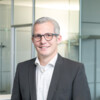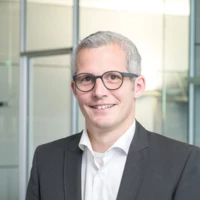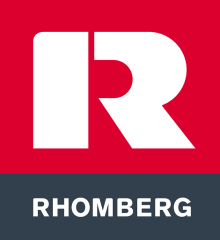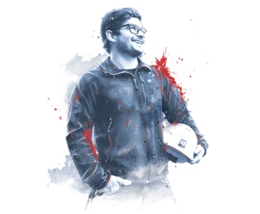Rhomberg Group Remains on the Road to Success: Historic Sales High
Rhomberg expands its group turnover and prepares itself for the future with innovations and new business models.
Bregenz, 27 September 2019 - DI Hubert Rhomberg and Ernst Thurnher, the two Managing Directors of the Rhomberg Holding, reflected on the very successful 2018/2019 financial year, which ran from 1 April 2018 to 31 March 2019 at the Rhomberg Group's annual press conference at its headquarters in Bregenz. With an increase in turnover of 6.6 percent compared to the previous year, the internationally active family-owned business can look back on a historic high. The good order situation and the positioning as a full-service provider in the construction and railway technology sectors are behind sales of EUR 753 million. EUR 325 million of this goes to the Construction/Resources division, the remaining EUR 428 million to the Rail Technology division. The number of employees rose from 2,668 to 2,845. Of these, 678 work in Vorarlberg (previous year: 642).
Focus on sustainable urban and neighbourhood development
Vorarlberg is and will remain the core market of the Rhomberg Group in the "Construction and Resources" segment: "We want to make good use of the land already used and develop it further. This will enable us to revive derelict industrial and commercial sites," is how Ernst Thurnher defines the company's strategy. In Vorarlberg and southern Germany, spatial and neighbourhood development will be intensified in order to continuously strengthen the location and to exploit new opportunities. In the long term, the existing mixed construction area on the acquired Rattpack site (17,500 m2) in Dornbirn is to be redeveloped together with the City of Dornbirn. The Generali site (14,000 m2) in Bregenz was also acquired for this purpose. The existing apartments on the site will continue to exist. The remaining area will be new and further developed, primarily to create living space.
The Rinker site in Ravensburg represents a milestone in the holistic development of the district. The 35,000 m2 site will not only house around 300 new apartments, but also social facilities such as day-care centres for children and commercial premises. The pilot project focuses on home and life for people of all ages and social backgrounds. Talks with key stakeholders are planned for the recently acquired 32,000 m2 Zechwald site (formerly known as the Kunert site) in Lindau in order to assess demand and jointly develop the former industrial site in a sustainable manner.
In Berlin, the Rhomberg Group is implementing a prestigious wood-hybrid construction project with the Zech Group at the Südkreuz. Within the next two years, two six-storey office and commercial buildings will be constructed, which will house the Vattenfall Energy Group, among others. This innovative and proven construction technology is a response to the current challenges of climate change: Compared to construction projects of this size, the project saves around 90 percent of CO2 emissions and once again demonstrates that sustainable timber construction can also be used for large-volume construction projects.
In order to provide affordable living space, charitable housing projects were realised during the past financial year in Meiningen, Rankweil, Lustenau and Wolfurt, for example, together with the social housing developers in the region.
The first construction phase of the currently largest property development project, Bäumlequartier in Lochau, has been completed. A total of 135 apartments and five commercial units will be built there in the immediate vicinity of Lake Constance.
In Switzerland, the entry as a property developer with local partners has been successful, the first projects are already being implemented. "Building Information Modeling (BIM) and Lean Management are also increasingly on our agenda here and show how innovation can have a positive impact on our work," summarises Thurnher.
"Sustainability is part of our corporate DNA. An important component of this is the Rhomberg Resource Centre in Hohenems/Dornbirn," Ernst Thurnher explains. In the past financial year, 185,000 tonnes of bulk materials were processed. Around half of this is used as aggregate for concrete, the remaining 50 percent as civil engineering and road construction materials. "This recycled quantity is sufficient for around 10.3 km of road - nine metres wide and including pavement," says Thurnher, illustrating the importance of the plant. This makes the continuation of the Unterklien quarry all the more important for the Rhomberg Group and the province of Vorarlberg. In a declaratory motion to Vorarlberg, clarity is required as to whether all processes are possible in an environmental impact assessment (EIA). The Rhomberg Group voluntarily strives for an EIA in order to ensure maximum transparency in the project.
Ready for the future
Despite the positive sales trend, the Rhomberg Group intends to further develop its "Strategy 2025" and is considering additional innovative services and an integral solution for climate-friendly refurbishments. "We expect to generate around 20 percent of our sales in 2025 with services that we do not yet offer in this form," explains Hubert Rhomberg.
As a full-service provider, the Rhomberg Group intends to further position itself and concentrates on alternative, sustainable residential models. One example of this is DAVID. The increasing need for living is countered with affordable, fully furnished 1-room rental apartments. The first location in Vorarlberg is already being planned.
Rail technology: New technologies in use
The Rhomberg Sersa Rail Group, in which Rhomberg holds a 50 percent stake, is the second strong pillar of the family business. "We were once again able to prove ourselves as an innovative full-range supplier of railway technology solutions and are focusing on sustainable, resource-saving mobility. We offer an almost complete range of services throughout the lifecycle of the railway," explains Rhomberg. The railway specialists concentrate on the home and core markets in the DACH (Germany, Austria and Switzerland) region as well as selected international markets such as Australia, Canada, the UK and Ireland. Framework agreements, such as with ÖBB, SBB or industrial customers, are also important. This makes it possible to offset fluctuations in the volatile project business.
In the past financial year, important contracts were completed or continued: More than 120 km of ballastless track are currently being laid on the new line between Ulm and Wendlingen. The contract is worth EUR 250 million. In Ireland, the subsidiary Rhomberg Sersa Rail Group Ireland secured a EUR 40 million contract for the maintenance of the rail network.
Digitalisation on the rise
The Rhomberg Group focuses on the varied possibilities of digitisation in the areas of construction and resources as well as railway technology. A forward-looking technology is used and tested in Vorarlberg: Together with the long-standing partner Montafonerbahn, a model is being developed that creates a digital image of the railway line and thus makes predictive maintenance possible.
In the area of construction and resources, the RHome collaboration platform is currently being implemented. It enables internal and external workflows to be simplified, transparency to be created and knowledge to be shared. All participants can access data simultaneously in virtual space. "In addition to the technical introduction, the challenge at the moment is to support employees in rethinking their working methods. But we are on the right track," concludes Hubert Rhomberg.

Questions?
Get in touch with us!
Contact now







